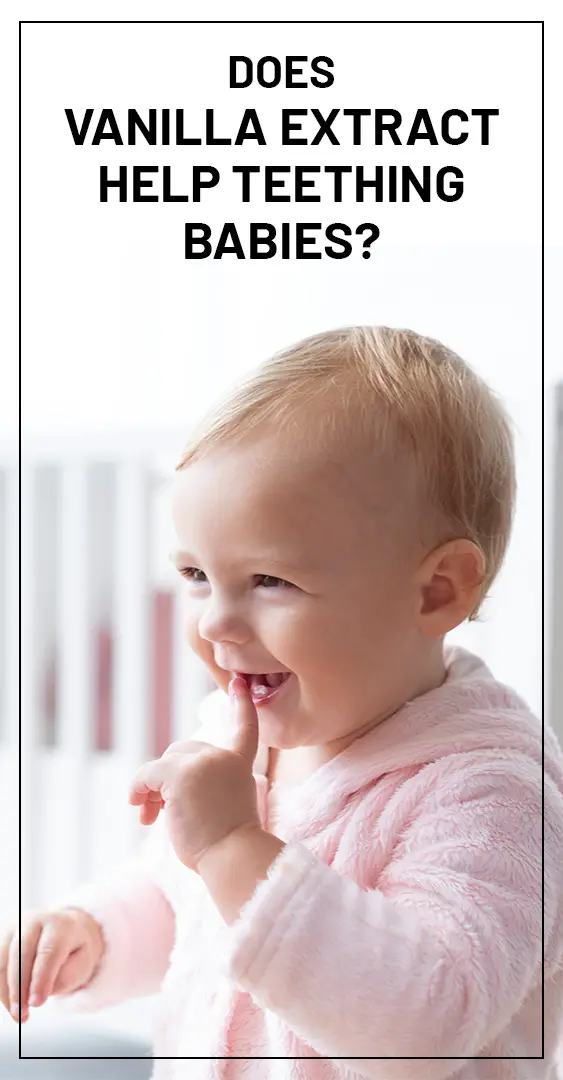
Important: This article is for informational purposes only. Please read our full disclaimer for more details.
Watching your baby achieve her growth milestones is exhilarating, but some milestones are not as elating as others, and teething is one of them.
Teething is discomforting and stressful. It irritates the child as the swollen gums bring uneasiness. At the same time, teething is often accompanied by an upset stomach and pain.
Different home remedies have traditionally been used for a long time to combat all these. Vanilla extract for teething is one powerful home remedy that relieves oral pain and swollen gums.
Even though using the vanilla extract for teething is not scientifically approved, a few properties and several credences make it a promising remedy. Besides, it is safe and has no side effects. Still, parents often face a dilemma and ask questions like, does vanilla extract help the teething babies?
Therefore, here we have discussed everything anxious parents want to know about vanilla extract- its potency, properties, and whether it is a good alternative to relax irritated gums or not.
Potency Of Vanilla Extract For Teething

Recent trends in using natural and organic ingredients to overcome pain and discomfort and improve health have made vanilla extract one powerful product. The medicinal use of vanilla extract has a long and standing history.
Using vanilla extract to ease the teething process is on the rise for good reasons. The healing properties make it extremely useful for managing the anxiousness of babies. At the same time, the small quantity of alcohol in the extract creates a comforting sensation.
What Properties Of Vanilla Extract Make It Good For Teething?
1. Vanilla Extract Works As A Relaxant.
The aroma of vanilla is soothing. It makes one feel relaxed and at ease. Since teething babies often get cranky with an increased level of anxiety, a relaxant like vanilla extract seems a potent remedy.
As a natural relaxant, the vanilla extract also helps put babies into a good night’s sleep. With aroma stimulating properties, it calms the brain cells and makes teething babies feel relaxed.
2. Vanilla Extract Is An Analgesic.
The presence of chemicals like eugenol, salicylic acid, and coumarin makes the vanilla extract a natural analgesic, providing huge relief from exuberating teething pain.
Due to swollen and tender gums, babies often feel pain in the oral zone, especially while eating and drinking. It is when rubbing the vanilla extract in the guns that can deliver its analgesic properties by numbing and relieving the pain and soothing the area.
Here, the main character is played by eugenol, which has pain-relieving and antiseptic properties. It acts on the ganglion of neurons around the tooth of the babies and reduces the orofacial pain.
3. Vanilla Extract Promotes Healing.
Another important compound found in vanilla extract is vanillin. It is a rich source of antioxidants that works as a natural healer. Also, it boosts the immunity which is needed for growing babies.
Additionally, the antibacterial properties of vanilla extract ensure managing the gum injury that may happen due to teething.
4. Vanilla Extract Has Anti-inflammatory Properties.
Swollen gums are the main reason behind pain, irritation, and discomfort among teething babies. Vanilla extract, with its anti-inflammatory properties, can help in reducing the inflammation of gums.
As the swelling reduces, pain also subsides, and the baby gets a huge relief. Rubbing vanilla extract on the gums of a teething baby alone gives promising results.
5. Vanilla Extract Helps With An Upset Stomach.
Teething babies drool excessively. Ingesting too much drool may upset the stomach. At the same time, the urge to put fingers and different things in the mouth while teething is high as the baby tries to ease the swollen gums.
All this leads to an upset stomach and difficulty in digestion. It is when vanilla extract, with its antibacterial properties, comes to the rescue. It calms the upset stomach and keeps bacterial infections at bay.
How To Use Vanilla Extract For Teething?
Even though vanilla may sound sweet and syrupy, it has a strong awful taste. Putting it down the baby’s mouth is not a cakewalk.
For using it on teething babies, dab some vanilla extract on your fingers and rub gently on your baby’s gums. It will release the compounds like Vanillin and Eugenol to work on the gums, reducing the pain and inflammation.
Is Vanilla Extract Safe?

Vanilla extract is safe for babies until you are using it in a safe dosage. Only a few drops are enough to calm the anxious baby.
According to FDA, Vanilla extract contains 35% alcohol. Therefore, it is permissible only in small quantities. Putting too much vanilla extract may result in alcohol poisoning.
It is one of the reasons why medical journals and pediatricians often recommend against using any substance with alcohol for pain relief, especially among babies while teething.
If parents are intimidated by using an alcohol-based product for teething, any imitation vanilla extract can help.
Final Words
Vanilla extract has properties that soothe a restless baby. Loaded with antiseptic, antibacterial, anti-inflammatory, and analgesic properties, vanilla extract makes a potent home remedy for teething babies.
It is helpful for gums, toothaches, and upset stomach. With so many benefits, vanilla extract for teething is worth trying.
So, the next time when you find your baby wailing away due to toothache, rub a small quantity of vanilla extract on the gums with your fingers and give an instant relaxation.
You Might Also Like:
- Home Remedies to Whiten Teeth Fast
- How to Whiten Your Teeth Naturally at Home
- How To Whiten Your Teeth With Baking Soda – 7 Best Ways
- 7 Best Teeth Whitening for Sensitive Teeth
- 7 Best Toothpastes For Sensitive Teeth
- What Causes Gum Growing Between Teeth & How To Correct It?
- How To Get Rid Of Cavities Using Baking Soda
- Home Remedies to Whiten Teeth Fast
- Baking Soda & Lemon Juice for Teeth Whitening
- 8 Best Home Remedies for Wisdom Tooth Pain Relief
- How to Whiten Your Teeth with Banana Peel
- Top 13 Benefits of Chamomile Tea + Chamomile Tea Recipes
- How to Stop Excessive Salivation
- How to Whiten Your Teeth Naturally at Home
- When Can I Eat Chips After Wisdom Teeth Removal?
- 7 Best Mouthwashes For Sensitive Teeth
















